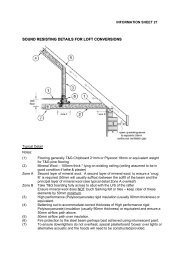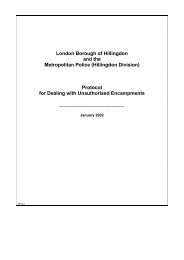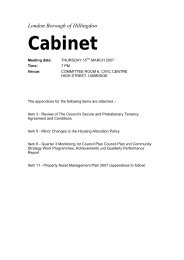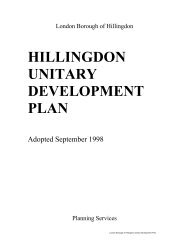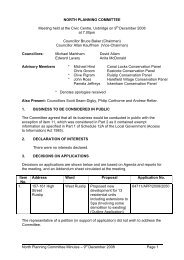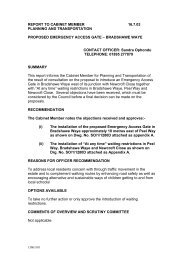Byatt Report - London Borough of Hillingdon
Byatt Report - London Borough of Hillingdon
Byatt Report - London Borough of Hillingdon
You also want an ePaper? Increase the reach of your titles
YUMPU automatically turns print PDFs into web optimized ePapers that Google loves.
Towards a National Strategy for Local Government Procurement<br />
SUPPORT FOR PROCUREMENT<br />
In January 2002, the LGA initiated a joint review with the Improvement and<br />
Development Agency (IDeA) and the Public Private Partnerships Programme (4Ps) <strong>of</strong> the<br />
role <strong>of</strong> those bodies in supporting local authority procurement, to ensure an effective<br />
response to the Taskforce recommendations and the Local Government White Paper. The<br />
review reported in May 2002. Acting on its recommendations, the IDeA and 4Ps, working<br />
closely with Office <strong>of</strong> Government Commerce and Partnerships UK, are co-operating to<br />
provide integrated support to local authorities, particularly on major projects and to ensure<br />
that the expertise <strong>of</strong> the 4Ps is applied across a wider remit than PFI projects alone.<br />
BEST VALUE AND PROCUREMENT<br />
In this response ‘procurement’ is used to mean ‘the acquisition <strong>of</strong> goods, works and services<br />
from third parties’, in accordance with the definition used across Government.<br />
Procurement in local government must be set in the broader context <strong>of</strong> best value. Local<br />
authorities have a duty to secure continuous improvement in the way they exercise their<br />
functions, including through reviews that consider alternative options for securing their<br />
objectives and then to choose those most likely to deliver best value. Every review<br />
involves a decision whether the local authority will itself provide the relevant goods, works<br />
or services or procure them from another provider. This choice is <strong>of</strong>ten referred to as the<br />
‘make or buy’ decision, although the range <strong>of</strong> options available is <strong>of</strong>ten much more complex.<br />
Best value implies that an authority must consider, in relation to all its activities, whether<br />
procurement rather than provision is the best value choice for securing its objectives. It<br />
also implies that authorities should begin every procurement by considering whether its<br />
approach – both the proposed specification and the proposed procurement method – can<br />
be justified by reference to best value. This does not mean that every procurement should<br />
be preceded by a best value review, although this may be appropriate before the<br />
procurement <strong>of</strong> major projects or services. It does mean that every authority should ensure<br />
that its approach to procurement complies with best value principles, if necessary by<br />
carrying out a best value review.<br />
Lessons from the first two years <strong>of</strong> best value are reflected in the White Paper and in the<br />
findings <strong>of</strong> the Best Value Review work by the Audit Commission and others. They point<br />
to a need to improve best value processes in five key areas:<br />
• to ensure that local authorities align best value reviews with strategic priorities and<br />
the key areas for improvement identified through CPA. As the pattern <strong>of</strong> best value<br />
reviews in the first year <strong>of</strong> best value became clear, DTLR, the Audit Commission, the<br />
LGA and IDeA all advised authorities to go for fewer, more strategic reviews focused<br />
on the authorities priorities for improvement. This advice stands and will be<br />
reinforced by the action plans agreed through CPA.<br />
12<br />
• to focus best value on improving services and outcomes. The focus <strong>of</strong> best value was<br />
always intended to be on improving services and outcomes for local people. But too<br />
<strong>of</strong>ten best value reviews have been processes to justify the status quo rather than<br />
focusing attention on priorities for improvement. Evidence from the Audit<br />
Commission suggests that in too many cases authorities have only looked at whether<br />
to tender or re-tender the existing service rather than focusing on how the service<br />
needed to be improved. This has <strong>of</strong>ten been associated with a narrow focus on cost in<br />
procurement at the expense <strong>of</strong> quality.





